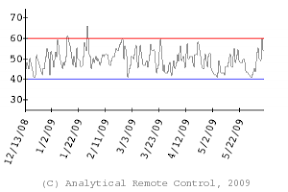Credit Bureau Alleges Lifelock Identity Theft Service is Fraud
Credit-reporting agency Experian has filed a lawsuit
against identity theft services company Lifelock,
charging it with "misleading advertising and fraud."
Additionally, Lifelock, allegedly placed fraud alerts
illegally on credit files maintained by Experian.

Experian’s lawsuit claims that LifeLock is engaging
in deceptive and fraudulent behavior by adding
hundreds of thousands of fraud alerts every 90
days to Experian’s consumer credit database in
a manner that was not intended by Congress when
it implemented the federal Fair Credit Reporting
Act (FCRA).
The complaint alleges that corporations are
specifically prohibited from adding fraud
alerts to consumer credit files and that LifeLock’s
service uses consumers’ free yearly allocation of credit
reports without adequate disclosure.
The heart of the Experian complaint and the media
counter attack from Lifelock is about money. While
Experian certainly has made some valid points in their
complaint, let's face it Lifelock's revenue stream comes
at the expense of the credit bureaus.
With over 700,000 members paying $10 monthly, according
to Lifelock, that's over $80 million in annual revenue. Now,
combine that with the $25 million in venture funding Lifelock
announced last month and - well you get the picture - especially
if you work at Experian. By the way, Experian markets their own
credit monitoring service as a means for consumers to protect
against identity theft.
How is the consumer's best interest being served in all of this
public squabbling over which company is wrong or right?
What should the average citizen do?
Well, let's take a closer look at Experian's complaint.
The Fair Credit Reporting Act (FCRA) is a federal law
which provides several rights to protect consumers and
their credit information. While, we're not lawyers here,
Experian raises an interesting point against Lifelock's
business model if in fact they are illegally placing fraud
alert requests.
Furthermore, if the average citizen knew they could request a
fraud alert themselves, thereby cutting out the middle man
(Lifelock), why would there even be grounds for Experian's
lawsuit.
While not taking sides, we can definitely inform our readers that
from a review of the Experian complaint, Lifelock appears to be
deriving revenue by taking advantage of the following services
which are free and/or can be directly ordered by any
consumer armed with the proper contact information:
Junk Mail Restricted
On the next business day after our request:
You will be sent an email from us stating that
we have processed the request to remove
your name from Junk Mail lists. Not only is
junk mail annoying, statistics show it’s also
one of the most common ways thieves hijack
your identity.
Pre-approved credit offers blocked
You will be sent an email from us saying that
we've asked for you to be removed from
pre-approved credit offer lists. Like junk mail,
by blocking irritating offers, we also block one
of the avenues thieves use to steal your identity.
Credit bureaus contacted
Within 24 hours of our request:
You will receive an email from us stating that
fraud alerts have been requested on your behalf.
When fraud alerts are established with the major
credit bureaus, creditors are required to verify
your identity before opening any new lines of
credit, issuing new cards or increasing your credit limit.
LifeLock orders credit reports You will receive an
email from us stating that your credit reports have
been ordered on your behalf from the major credit
bureaus. Your reports will be sent directly to you.
What is a Fraud Alert?
Usually within an hour of your enrollment as
a member of LifeLock, we request alerts be
set on all of your credit reports at Equifax,
Experian and TransUnion. Within a week
or two after enrolling, these major credit
bureaus will send you credit reports showing
your alerts are in place.
So, our tip for today is two fold. Before considering
services from Lifelock, take a close look at what
you actually can get by directly engaging the
sources:
Junk Mail Restricted
DMA’s Mail Preference Service
Pre-Approved Credit Offers Restricted
www.optoutprescreen.com
1-888-5-OPTOUT (1-888-567-8688)
Fraud Alerts Placed with Credit Bureaus
Free Credit Reports
AnnualCreditReport.com
1-877-322-8228
Finally, as part of our second tip, make sure
to check out the rest of our website to find
the many other no or low cost options you
can leverage against would be identity thieves.
Remember, only a portion of all identity theft
cases are the result of someone getting
access to your credit information.
Medical, criminal, & public information is more
accessible and vastly harder to detect abuses
against than a credit file.
So, make sure to also tell a friend about this
important new development in identity theft
prevention tips.

















